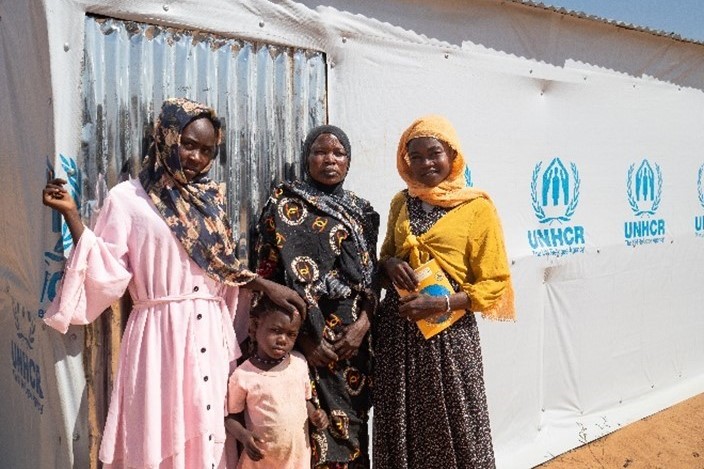In 2023, UNHCR has been challenged by financial constraints despite ever-growing humanitarian need and forced to do more with less. Unearmarked contributions, such as those from Norway and Sweden, fund UNHCR’s vital operations in forgotten crises and enable UNHCR to plan and implement effective and sustainable humanitarian responses.

Construction work for shelters, latrines and showers are ongoing at the relocation site for Sudanese refugees in Korsi, Central African Republic. © UNHCR/Josselin Brémaud
Although worldwide forced displacement is at a record high, UNHCR has only received funding to cover 32% of its global budget in 2023. This has dire implications for UNHCR’s activities and the people who suffer in situations that are already underfunded as humanitarian budgets are cut The countries most impacted by underfunding are poorer and lower-middle income countries, hosting 90% of forcibly displaced and stateless people worldwide. Unearmarked funding is needed to continue life-saving activities in these forgotten situations, and crucially, also allow for investing in resilience and building longer-term solutions.
Sweden and Norway have been reliable top donors of unearmarked funding for UNHCR. Their contributions this year made a difference where it was needed the most.
In 2023, Democratic Republic of the Congo, Chad and Central African Republic were among the most severely underfunded situations, affecting UNHCR’s work to respond, protect, empower, and solve. These are three countries that struggle with protracted displacement crises as well as political instability, insecurity, and economic challenges.
Despite the dire financial situation, unearmarked funding has enabled UNHCR to continue delivering protection, shelter and core relief items, risk prevention and responses to gender based violence, education, and health services in these operations.

Democratic Republic of the Congo – Children are bearing the brunt of decades of war in the Democratic Republic of the Congo. Almost 30% of the children displaced from North Kivu during the armed clashes are unaccompanied, or lost track of their parents while fleeing. UNHCR works to ensure separated children can reunite with their families. While UNHCR and partners have supported access to education for displaced people, chronic underfunding has led to the level of primary education for refugee children to be only 42%.

Democratic Republic of the Congo – In crowded sites for people internally displaced by armed conflict, health is a major problem. UNHCR’s core relief items like jumps, blankets and jerry cans improve the hygiene in camp conditions, help prevent the spread of communicable diseases like cholera through sanitation and give shelter from mosquitos. In the first half of 2023, over 12,500 children under 5 years old also received a vaccine against measles.

Chad – The number of new refugee arrivals from Sudan has already surpassed existing capacity at refugee camps, and UNHCR is establishing new camps to accommodate the increasing need for shelter. In November 2023, UNHCR with its partners relocated 432 Sudanese refugee families who were sleeping at a school at the Farchana refugee camp to new shelters in the camp extension, allowing for families to have their own space and for the school to re-open for students.

Chad – UNHCR is gravely concerned about gender-based violence and child protection due to the high number of women and children among the new arrivals. the number of gender-based violence incidents reported to UNHCR increased dramatically between April and November 2023. UNHCR is providing survivors with psychosocial therapy and financial assistance.

Central African Republic – As part of the response to the refugee arrivals from Sudan, UNHCR supports the Korsi site some 65 km away from the border, where refugees and CAR returnees have received water, psychosocial support and relief items like tarpaulins, buckets, soaps, mats, torches, and second-hand goods. In September 2023, UNHCR and partners also distributed 17,810 tons of food to nearly 500 households.

Central African Republic – In addition to the displacement crisis, 1.1 million people are at risk of statelessness, facing serious protection concerns such as family separation and forced recruitment. Unearmarked funding makes a significant difference for UNHCR’s protection response, being able to provide legal orientation, counselling, and assistance in family reunification.
Norway as a donor to UNHCR:
As one of the largest governmental donors, Norway is a reliable and true partner for UNHCR. In 2023, USD 63.1 million of Norway’s contributions were unearmarked, 66% of its total contribution of USD 95.4 million. Norway’s unearmarked funding allows UNHCR the life-saving flexibility to respond to emergencies as they happen as well as continue operations in underfunded contexts. In addition to its unearmarked funding, Norway also contributed USD 935,000 earmarked to the Democratic Republic of the Congo Situation.
Sweden as a donor to UNHCR:
In 2023, Sweden has donated USD 118.9 million to UNHCR, of which USD 69 million, equivalent of 59%, is . As the largest provider of multi-year unearmarked funding, Sweden helps make it possible for UNHCR to reach remote areas and to prioritize for underfunded refugee crises globally. In addition to the consistent unearmarked funding, Sweden also contributed USD 3.3 million to the Democratic Republic of the Congo situation and USD 3.5 million to the Chad situation.
Share on Facebook Share on Twitter